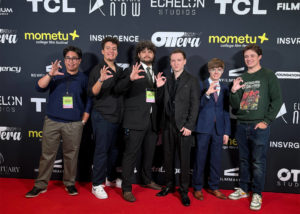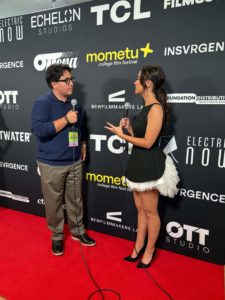
School of Theatre, Film & Television filmmakers made a significant impact at this year’s Mometu College Film Festival, a platform for recognizing and showcasing the talents of emerging student filmmakers hosted annually by the free streaming service Mometu. From entries representing nearly 40 film schools, nine TFTV films were selected to be featured in the online portion of the festival. Two filmmakers went on to earn top honors in their respective categories and the opportunity to present their films at an in-person screening in Los Angeles for an audience of industry professionals.
Xander Maniece’s senior thesis film, The World We Live In, impressed judges with its vision and heart, earning the award for Best Potential Series Pilot. Alek Mendez’s film Quédate Un Rato captivated judges with its moving and emotional storytelling, securing the Best Foreign Language Film award.
On July 26, Xander and Alek travelled to Los Angeles for the special showcase screening of their films alongside the winners of the festival’s five other categories. In the following Q&A, they share their experience.
The Mometu College Film Festival took place at the landmark Harmony Gold Screening Room on Sunset Boulevard, a venue regularly used by studios and filmmakers for film and television screenings. What was running through your mind as you watched your film on the Harmony Gold screen?
Xander: It’s always a pleasure to see your own work up on any big screen, but I must say, seeing The World We Live In on the Harmony Gold screen was especially surreal. It truly made me proud to see that the hard work that everyone put into this film could be appreciated on such a massive scale.
Alek: I agree – sitting in the Harmony Gold Screening Room was surreal. It’s a space that’s hosted countless premieres and private screenings, and to see Quédate Un Rato showcased on the big screen in Los Angeles was humbling and electrifying all at once. As a Latino filmmaker, it also felt significant to bring a culturally rooted story to a stage built on grounds rich with a familiar Latino history. It was a reminder that our voices have a place in these spaces, and that the stories I grew up with deserve to be seen on screens like these.
You represented TFTV alongside filmmakers from Chapman, Morehouse, and SCAD among other film schools. How did it feel to have your work selected and presented alongside this strong cohort of emerging filmmakers?
Xander: At first, it was intimidating seeing our work alongside films made at private film schools that have more resources, but then I realized that it was really an honor. And I was delighted to interact with the other filmmakers and realize that we are all just people going for a similar dream.
Alek: It was an honor to be part of such a strong lineup. These are filmmakers whose work pushes boundaries, and being included alongside them made me feel proud of what I created, but also reassured me that I had a space in this lineup amongst these ambitious storytellers. It’s inspiring to see the range of voices and styles emerging right now, and it reaffirmed why I want to keep making films that feel personal but also resonate universally.

Xander, you attended with members of your film crew including producer Jackson Bowerman, sound designer Brady McDowell, lead actor Peter Henderson and gaffer/producer Ozaawaa Burnett. How do you feel their contributions shaped the film, and what does it mean to you to have shared this festival experience with the team that helped bring your vision to life?
It was important to me to share the spotlight with them. This film would not have been possible without their contributions. I was extremely proud that so many crew members could join me that night – it made the experience so much more memorable. Without a crew, even the best directors are just people with ideas, and the specific people we choose to join us on that journey are what turn those ideas into something as special as a film.
Alek, you chose to film Quédate Un Rato entirely in Spanish. What message or feeling did you hope to convey to audiences by immersing them in the Spanish language experience? And what did it mean for you to go on to win Best Foreign Language film?
Choosing to tell Quédate Un Rato entirely in Spanish was about authenticity and respect for the story’s roots. The film is set in Sonora, and language was key to capturing the culture, intimacy, and emotional tone of that place and time. Spanish wasn’t just any other language; it’s the way my family, for generations, have expressed their love, their grief, and their devotion in a tongue that carries words and feelings English simply does not have a translation for. It shaped how the characters spoke, moved, and related to one another, creating a world that felt honest to who we are.
Winning Best Foreign Language Film was deeply meaningful to me. Especially in today’s world, where violence and prejudice towards Latinos linger, this win feels like more than just an award – it’s a small but powerful statement. It’s a recognition that our voices, our culture, and our language deserve to be heard. It’s proof that telling stories in the most authentic way possible has value, and that audiences are ready to embrace narratives that reflect our identity, our resilience, and our humanity.
You both graduated this year from TFTV. What are you working on now, and/or what are your future career plans?
Xander: Right now, I am planning to continue working on film projects in Tucson while further developing my career. I also plan to continue my current venture of making music videos for local artists in Arizona.

Alek: Since graduating with a BFA in Film & Television Production, I’ve been focusing on building my career as both a cinematographer and director. After Quédate Un Rato’s festival run, I’m developing my next short film – one that blends drama with touches of humor while continuing to explore Mexican/Latino identity. Alongside that, I’ve been tending to my family and seeking opportunities to collaborate with more talented filmmakers between Los Angeles and Arizona, with the long-term goal of continuing to tell culturally rooted, emotionally resonant stories that inspire others to pursue their voice the same way I am pursuing my own.
Lastly, a question we love to ask our alumni: who at TFTV inspired you and why, and what did you learn at TFTV that you continue to value?
Xander: I would certainly like to thank both Alex Leyton and Dave Wing for their willingness to mentor me throughout college and giving me insight into the filmmaking process that has helped develop my path as a filmmaker. I would also like to thank Kerryn Negus and Lisanne Skyler for believing in my thesis film and helping to guide its journey on the film festival and awards circuit.
Alek: At TFTV, my biggest inspirations have come from Kerryn Negus, Professor Alex Leyton, and Professor Jacob Bricca. Each of them encouraged me in moments when I needed it most. Whether it was pushing me to take creative risks, reminding me to trust my instincts, or helping me see my voice as something worth sharing, they have all helped me craft the storyteller I am today. The biggest lesson I carry forward is the power of collaboration. TFTV taught me how to build creative partnerships where everyone feels ownership of the story, and as a Latino filmmaker, I see that as essential. Collaboration isn’t just about making films; it’s about creating space for different voices, perspectives, and lived experiences to exist together. To work with those who carry a strong desire to be not just the best creatives they can be, but the best person. That spirit has shaped the way I approach every set I will ever work on.
